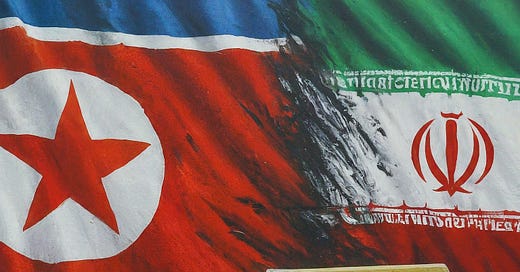Reaction to PoE veto; Woes of returning NK workers from PRC; Iran’s economic activity last year; BRICS and blockchain
Prohibited Transactions for the week of 1 Apr 2024 (#43)
North Korea
Following the Russian vote blocking the renewal of the UN Panel of Experts (PoE) on North Korea’s illicit activities (see Issue #42), sanctions experts have weighed in on the broader context and impact of Moscow’s actions. Aaron Arnold, a former finance expert on the PoE (and currently with RUSI) notes:
Unfortunately, Russia’s actions have far more dire consequences than merely bringing an end to a UN body responsible for monitoring compliance with one of the world’s largest and most complex sanctions regimes. Not only will countries lose access to authoritative sources of information, but it is likely that the sanctions against North Korea will now persist in a zombie-like state — neither updated nor monitored.
Anthony Ruggiero and Andrea Stricker from FDD want to turn up the pressure on Russia and the PRC:
Last week, the Biden administration and the South Korean government targeted North Korean financial representatives in China and Russia that provide Pyongyang access to the international financial system. Yet these actions were not comprehensive since they did not target the Russian and Chinese companies, individuals, and banks that aid North Korea’s sanctions evasion. In light of Moscow’s destruction of the UN panel and persistent violations of UN sanctions by both Russia and China, the administration must adjust its approach to directly penalize these actors.
Jeff Nielsen, a sanctions and export controls lawyer said the PoE report was “pretty good (though sometimes white-washed as to Western companies complicit in bad activity).” //Not to let any Western companies off the hook, but I don’t think that’s been the biggest flaw in the PoE’s reporting throughout the years.
Joshua Stanton, who helped draft the US’ 2016 Sanctions and Policy Enforcement Act noted that the Russian veto should be seen “as an opportunity to break free of Russian and Chinese obstructionism, to build a better coalition, and to give sanctions investigation and enforcement the vigor the U.N. system always denied.” Possibilities for non-UN monitoring of the DPRK’s illicit activities includes the Proliferation Security Initiative (PSI), the Egmont Group, or even the recently created Enhanced Disruption Task Force (see Issue #42).
--
South Korea seized a stateless vessel, the Di Yi, off the country’s southern coast — apparently at the request of US authorities — accusing it of violating the UN’s DPRK sanctions. The vessel was reportedly en route to Russia from North Korea, via the PRC. The Di Yi is owned by a Hong Kong-based company, and though currently flagless, was previously reported as flying the flag of Togo.
Seoul announced it is imposing sanctions on a number of Russian vessels, companies and individuals involved in moving munitions to the DPRK, as well as transporting North Korean workers overseas. Moscow said it will respond to this “unfriendly step.”
According to covert reporting from inside North Korea, a resident of Pyongyang has been arrested by North Korean police for using counterfeit US dollars to buy goods. //Finally North Korean authorities are worried about fake US dollars.
North Korean workers returning from the PRC have been given bank-issued money vouchers, instead of North Korean won, angering many of the workers, who have little trust in the government’s IOUs.
North Korean trade officials based in the PRC have been smuggling luxury goods into the DPRK, via the personal luggage of North Korean workers who are returning home.
Iran
With the beginning of the new year in Iran, roundups of the previous calendar year’s (March 2023 – March 2024) economic activity are being released. A government official reported a 36 percent increase in commodities transiting the country, reaching 17.7 million tons of goods.
The increase is attributed to the government building relationships and paying closer attention to cooperation on transit issues with neighboring countries. For the upcoming year, the official noted that one of the main priorities for the Transport Ministry will be involvement in transit issues as related to the Belt and Road Initiative (BRI), Shanghai Cooperation Organization (SCO), Economic Cooperation Organization (ECO), and Eurasian Economic Union (EAEU).
Iran’s oil exports earned USD36 billion, with overall foreign trade reaching USD153 billion, a 2.6 percent increase from the preceding year. Liquefied natural gas, liquid propane and bitumen were the top three exported products.
The top export destination of Iranian goods by value:
PRC — USD13.9 billion
Iraq — USD9.2 billion
United Arab Emirates — USD6.6 billion
Türkiye — USD4.1 billion
India — USD2.1 billion
Top exporters of goods to Iran by value:
United Arab Emirates — USD20.7 billion
PRC — USD18.5 billion
Türkiye — USD7.5 billion
Germany — USD2.1 billion
India — USD1.9 billion
Iran’s minister of economic and financial affairs stated that the rise in global oil prices did not contribute to the country’s economic growth over the past year. //The implicit claim is that the economy improved due to the leadership of President Raisi, which is a recurring theme in most of the state run media’s English language reports.
--
According to Russian media, Moscow and Tehran are working on the final details of a “comprehensive new treaty” in order to establish a “long-term strategic partnership.”
The upcoming 28th Iran International Oil, Gas, Refining and Petrochemical Exhibition (Iran Oil Show 2024) will involve more than 1,500 domestic Iranian companies and 250 foreign companies, including from Russia, the PRC, Germany, France, Japan, Canada, Italy, Türkiye, Belarus, India, Austria, and Argentina.
Iranian media is highlighting statements made last month by a Russian official that a BRICS payment system will be based on digital currencies and blockchain technology.



